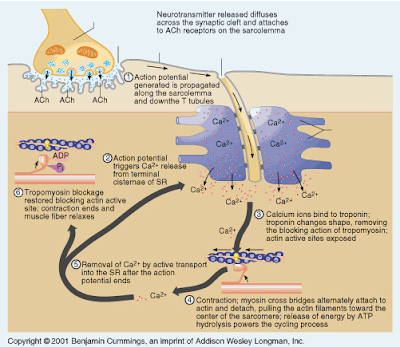Enzyme of the month May edition-Acetylcholinesterase
Have you ever wondered how your muscles
contract? How the muscles allow you to run, walk, write or even digest your
food? It is all thanks to the muscle contraction mechanism which involves an
important neurotransmitter known as “Acetylcholine.” Let us dive into some
brief details about this process. Now you might wonder where does our enzyme of
the month-Acetylcholinesterase falls into this sweet muscle contraction story.
Do not worry we will be going over our enzyme of the month and its importance.
An important aspect of muscle contraction is the generation of the action
potential. How is this action potential generated? The answer is the
neurotransmitter Acetylcholine. When this neurotransmitter binds to the
receptor, the process of muscle contraction begins. If you want to explore the
complexity of the muscle contraction, please refer to the image below:
Image citation link: http://legacy.owensboro.kctcs.edu/gcaplan/anat/notes/api%20notes%20j%20%20muscle%20contraction.htm
As seen in the picture above, for contraction to take place, the step of the ACh binding to the receptor is super important. However, I am sure you do not want to keep running forever and you
do not want to digest food when you have not eaten in a while. So what causes
the muscle contraction to stop? This is where our enzyme of the month-
Acetylcholinesterase comes into the picture. As a typical enzyme, it catalyzes
the breakdown of the neurotransmitter into acetic acid and choline. And as
structure defines the function, the neurotransmitter cannot bind to the
receptor anymore and the contraction stops. This allows you to stop running
when you are tired.
Have you wondered what might happen if this awesome enzyme stops working? The
inhibitors of this enzyme are referred to as organophosphates and are commonly
used in agricultural pesticides2.In fact, many researchers have raised their concerns about
over-exposure to the organophosphates to humans through the food consumed. A common condition caused by the organophosphates is muscle fasciculations or involuntary muscular contractions2.
Another condition that might result from organophosphates is bradycardia (a
condition associated with slower heart rate). Hence through the pathologies
described above, we can really evaluate the importance of our enzyme of the
month.
I hope that this month’s edition of the Enzyme of the Month series has helped you
to really understand the importance of the enzymes. As always please remember
to respect the amazing complexities of biochemistry.
References:
1.
Purves
D, Augustine GJ, Fitzpatrick D, et al., editors. Neuroscience. 2nd edition.
Sunderland (MA): Sinauer Associates; 2001. Acetylcholine. Available from: https://www.ncbi.nlm.nih.gov/books/NBK11143/
2.
Trang A, Khandhar PB. Physiology,
Acetylcholinesterase. [Updated 2020 Jul 10]. In: StatPearls [Internet].
Treasure Island (FL): StatPearls Publishing; 2021 Jan-. Available from: https://www.ncbi.nlm.nih.gov/books/NBK539735/

